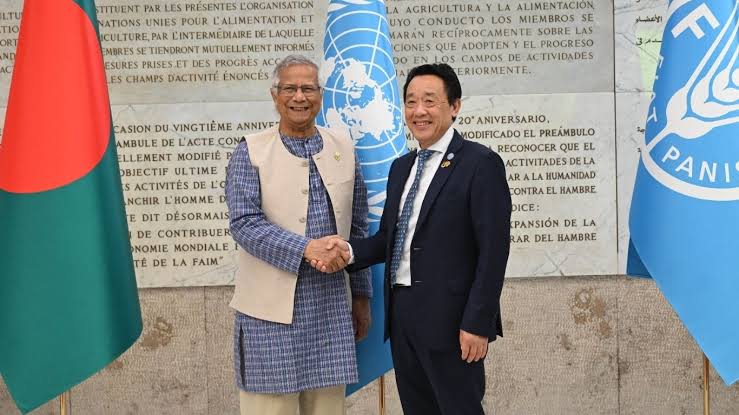Diplomatic Correspondent
Published:2025-10-13 19:48:04 BdST
CA rolls out 6-point proposal to ensure global food security
Bangladesh’s Chief Adviser Professor Muhammad Yunus has called for a fundamental overhaul of the global economic system to eliminate hunger and inequality, unveiling a six-point proposal to ensure global food security during his keynote address at the opening of the World Food Forum 2025 in Rome on Monday.
Speaking before world leaders, policymakers and youth delegates at the FAO plenary, Dr Yunus said hunger in today’s world was not the result of scarcity, but of “a moral failure” in an economic framework that rewards profit over people.
“In 2024, 673 million people went hungry — yet we produced more than enough food,” he said. “While we couldn’t raise a few billion dollars to end hunger, the world spent 2.7 trillion dollars on weapons. Is this how we define progress?”
The Chief Adviser’s address — his first major international speech since Bangladesh’s democratic transition earlier this year — reflected a mix of moral urgency and structural reform, positioning food as both a human right and a global security issue.
Yunus outlined a six-point plan to tackle the hunger–conflict cycle, calling for the creation of regional food banks, an end to export bans, and greater access to technology for the Global South.
The proposals also include fulfilling global SDG financing commitments, empowering youth entrepreneurs, and ensuring food access in conflict zones through dialogue and peacebuilding.
“We must break the hunger–conflict cycle — stop the wars, start the dialogue,” he said. “Trade rules must support food security, not undermine it.”
Yunus praised the Food and Agriculture Organisation’s (FAO) “bold vision” in transforming the World Food Forum into “a platform for action, not just discussion.” Marking FAO’s 80th anniversary, he said the milestone was “a call to prepare for the future,” urging nations to move beyond rhetoric and reimagine food systems as engines of justice and dignity.
Reflecting on recent events at home, Yunus told delegates that Bangladesh’s peaceful civic movement last year — led largely by young people — had restored “the people’s power to ensure democracy, peace, and human rights.” He said youth were now at the centre of rebuilding Bangladesh’s institutions and governance, ahead of the national elections scheduled for February 2026.
“Today, those young people are shaping a new Bangladesh — one that puts its people at the centre of governance,” he said.
Yunus also highlighted Bangladesh’s progress in agricultural self-sufficiency despite limited land resources, noting that the country now feeds over 170 million people and shelters 1.3 million Rohingya refugees.
He cited significant gains in rice production, mechanisation, and the development of 133 climate-resilient rice varieties.
“Our farmers have achieved cropping intensity of 214 per cent. We are greening agriculture, protecting soil, water, and biodiversity,” he added.
The Nobel Peace laureate urged leaders to move beyond profit-maximisation and adopt what he termed “social business” — enterprises designed to solve problems without personal profit. This model, he argued, can drive sustainable food production, create jobs, and curb wealth concentration.
“We need a new kind of business — business that solves problems, not creates them,” he said. “Social business is the way forward.”
Yunus called for the creation of social business funds to finance young entrepreneurs, farmers, and agri-tech innovators, saying such initiatives could “turn job seekers into job creators.”
He envisioned a “Three-Zero World” — zero wealth concentration, zero unemployment through universal entrepreneurship, and zero net carbon emissions — as the ultimate goal of global cooperation.
Stressing the role of youth in shaping the future of food systems, Yunus said, “Today’s young people are not like before. They are connected, creative, and have technology in their hands that was unthinkable 20 years ago.”
He urged world leaders to trust and invest in the next generation through access to capital, agri-innovation hubs, and climate-smart enterprises. “If we invest in youth, we will not only feed the world — we’ll change the world,” he declared.
Yunus reaffirmed Bangladesh’s commitment to the Global Alliance Against Hunger and Poverty, launched under the G20 with FAO’s support, and pledged “real, practical support — technical, financial, and moral.”
Concluding his speech, the Chief Adviser called on nations to unite around FAO’s 2025 theme, “Hand in Hand for Better Food and a Better Future.”
“Today’s world has the resources and the technology,” he said. “If we can imagine it, we can create it.”
Unauthorized use or reproduction of The Finance Today content for commercial purposes is strictly prohibited.


